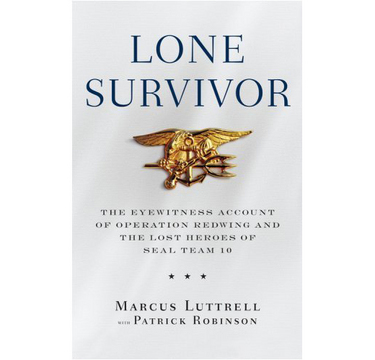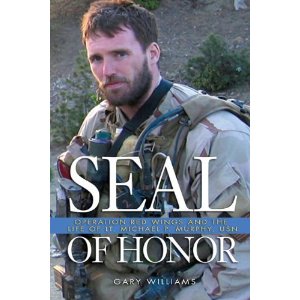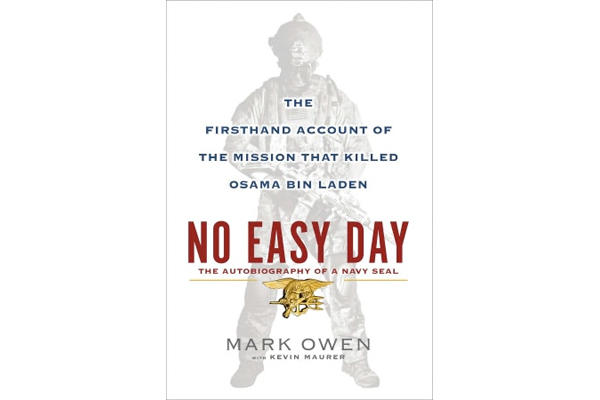Why are Navy SEALS so effective?

SEALS go anywhere (Sea, Air and Land). They are the best conditioned, best trained, best equipped fighting force on Earth. But is there is more to the story?
One often overlooked element is an unsurpassed dedication to the team. This is not the kind of “teamwork” that we talk about in business or sports.
In business, teamwork often happens begrudgingly. In many organizations, there is little or no alignment between people or departments. What we often call teamwork is more like the strained alliances of fractious parties in a parliamentary government. Each individual protects his own turf, viewing others suspiciously while contributing as little as possible to the team. This is not real teamwork.
SEALS on Teamwork
SEALS view teamwork differently. Teamwork is a force multiplier. Teamwork is a matter of life and death. Teamwork is born in training and demonstrated when members give their last full measure for the team.

In his book, Lone Survivor: The Eyewitness Account of Operation Redwing and The Lost Heroes of Seal Team 10, Marcus Luttrell illustrated how SEALs understand teamwork.
After their position was exposed by a goat-herder on a mountain in Afghanistan, Luttrell and 3 fellow SEALS fought off an overwhelming Taliban force.
Soon after the firefight began, Lt. Mike Murphy was shot in the stomach, but he “was ignoring his wound and fighting like a SEAL officer should, uncompromising, steady, hard-eyed, and professional.”
Shortly thereafter, Marcus wrote that he saw Danny Dietz’s thumb “blown right off. And I saw him grit his teeth and nod, sweat streaming down his blackened face. He adjusted his rifle, banged in a new magazine with the butt of his hand, and took his place in the center of our little gun line.” Danny would continue to return fire in spite of each of the five wounds (including one to the neck) that would eventually take his life.
When Luttrell saw Matthew “Axe” Axelson shot in the chest, he recorded:
This could not be happening. Matt Axelson, a family fixture, Morgan’s best friend, a part of our lives. I started calling his name, irrationally, over and over. Privately I thought Danny was dying, and all I could see was a stain of blood gathering in the red dirt where Axe was slumped. For a brief moment I thought I might be losing it.
But then Axe reached for his rifle and got up. He leveled the weapon, got a hold of another magazine, shoved it into the breech, and opened fire again, blood pumping out of his chest. He held his same firing position, leaning against the rock. He showed the same attitude of solid Navy SEAL know-how, the same formidable steadiness, staring through his scope, those brilliant blue eyes of his scanning the terrain.
After being shot in the stomach earlier, Lt. Murphy was hit again–this time in the chest. He asked for another magazine and continued to fight. Then, what happened next was simply unimaginable. Luttrell wrote:
He groped in his pocket for his mobile phone, the one we had dared not use because it would betray our position. And then Lieutenant Murphy walked out into the open ground. He walked until he was more or less in the center, gunfire all around him, and he sat on a small rock and began punching in the numbers to HQ.
I could hear him talking. “My men are taking heavy fire…we’re getting picked apart. My guys are dying out here…we need help.”
And right then Mikey took a bullet straight in the back. I saw the blood spurt from his chest. He slumped forward, dropping his phone and his rifle. But then he braced himself, grabbed them both, sat upright again, and once more put the phone to his ear.
I heard him speak again. “Roger that, sir. Thank You.” Then he stood up and staggered out to our bad position, the one guarding our left, and Mikey just started fighting again, firing at the enemy.
He was hitting them too, having made that one last desperate call to base, the one that might yet save us if they could send help in time, before we were overwhelmed.
Only I knew what Mikey had done. He’d understood we had only one realistic chance, and that was to call in help. He knew there was only one place from which he could possibly make that cell phone work: out in the open, away from the cliff walls.
Knowing the risk, understanding the danger, in the full knowledge the phone call could cost him his life, Lieutenant Michael Patrick Murphy, son of Maureen, fiancé of the beautiful Heather, walked out into the firestorm.

His objective was clear: to make one last valiant attempt to save his two teammates. He made the call, made the connection. He reported our approximate position, the strength of our enemy, and how serious the situation was. When they shot him, I thought mortally, he kept talking….
An act of supreme valor. Lieutenant Mikey was a wonderful person and a very, very great SEAL officer. If they build a memorial to him as high as the Empire State Building, it won’t ever be high enough for me.
A memorial was built. The guided-missile destroyer USS Michael Murphy (DDG 112) was commissioned on October 6, 2012. Murphy was also awarded the Medal of Honor posthumously.

What Motivates This Level of Dedication to the Team?
 Maybe it is because the SEALS are selective. After all, they only take recruits who are in top condition.
Maybe it is because the SEALS are selective. After all, they only take recruits who are in top condition.
Maybe it was because these men had endured some of the most difficult training that the military has to offer. SEAL training (BUDs) lasts 25 weeks. By all accounts, it is grueling both physically and mentally. All a recruit has to do is ring a bell to make the pain stop, and this is quite a temptation when recruits are cold, wet, and exhausted. Two thirds of those selected for BUDs wash out of the program. Or, maybe it is something more.
For me, two primary lessons stand out.
The first lesson was revealed in the following passage of Luttrell’s book:
One time during Indoc while we were out on night run, one of the instructors actually climbed up the outside of a building, came through an open window, and absolutely trashed a guy’s room, threw everything everywhere, emptied detergent over his bed gear. He went back out the way he’d came in, waited for everyone to return, and then tapped on the poor guy’s door and demanded a room inspection. The guy couldn’t work out whether to be furious or heartbroken, but he spent most of the night cleaning up and still had to be in the showers at 0430 with the rest of us.
I asked Reno about this weeks later, and he told me, ‘Marcus, the body can take [expletive deleted] near anything. It’s the mind that needs training. The question that guy was being asked involved mental strength. Can you handle such injustice? Can you cope with that kind of unfairness, that much of a setback? And still come back with your jaw set, still determined, swearing to God you will never quit? That’s what we’re looking for.’ (p. 102)
The lesson being taught was mental toughness. In the academic literature, it is called “grit.” Dedication was developed by training that required SEALS to be comfortable with the hard realities of warfare–to recognize that life is not fair.
The second lesson is the actually the first lesson that SEALS learn in BUDS training. It is drilled into every SEAL.
The SEAL creed:
I will never quit. I persevere and thrive on adversity. My Nation expects me to be physically harder and mentally stronger than my enemies. If knocked down, I will get back up, every time. I will draw on every remaining ounce of strength to protect my teammates and to accomplish our mission. I am never out of the fight. (p. 7)
I wonder how different things would be if individuals in organizations had even a fraction of this mentality. What if we acted like teammates and we defended one another with our eyes fixed on the mission? What would happen if we determined that we would never quit. What if we decided we would “draw on every remaining ounce of strength to protect our teammates and accomplish our mission.” I think we would have fought our way out of the recession by now. What do you think?
The Professor’s Recommended Reading:
and
If you are interested in additional leadership lessons from the military, you might also want to read the article: Love the Suck.
-Darin Gerdes, Ph.D.
_______________
Dr. Gerdes is the Director of the MBA Program at Charleston Southern University. All ideas expressed on www.daringerdes.com are his own.


